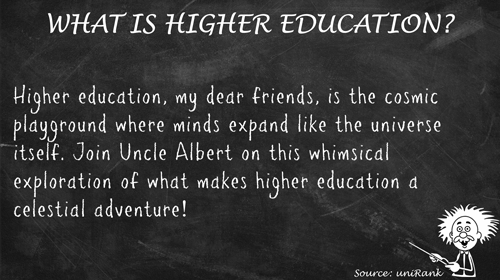 What is meant by higher or tertiary education? Higher education refers to education beyond the high school level, typically including undergraduate and graduate studies. It involves a range of institutions, including colleges, universities, vocational schools and trade schools, that offer advanced education in a variety of disciplines. Higher education has become increasingly important in today's global economy, as more and more jobs require advanced skills and knowledge. This uniRank article explores the meaning and some aspects of higher education.
What is meant by higher or tertiary education? Higher education refers to education beyond the high school level, typically including undergraduate and graduate studies. It involves a range of institutions, including colleges, universities, vocational schools and trade schools, that offer advanced education in a variety of disciplines. Higher education has become increasingly important in today's global economy, as more and more jobs require advanced skills and knowledge. This uniRank article explores the meaning and some aspects of higher education.
Access to higher education in history
Historically, higher education was reserved for the wealthy and privileged members of society. However, in the late 19th and early 20th centuries, the democratization of education and the introduction of public funding for higher education made it more accessible to a broader range of people. Today, millions of students around the world attend colleges and universities, many of whom come from families that could not afford to send them to school in the past.Individual aims and benefits of higher education
The primary purpose of higher education is to provide students with the knowledge, skills and experiences they need to succeed in their chosen careers. Higher education programs are typically designed to prepare students for careers in a specific field or industry, providing them with specialized knowledge and skills that are necessary for success. This can include coursework in a variety of areas, such as mathematics, science, medicine, engineering, business, social sciences and humanities.In addition to vocational training, higher education also provides students with a broad range of life skills that they can use in their personal and professional lives. These skills include critical thinking, problem-solving, communication, teamwork, leadership and more. Many employers place a high value on these skills, recognizing that they are essential for success in today's rapidly changing job market.
Another important benefit of higher education is that it can lead to higher salaries and better job prospects. Studies have consistently shown that individuals with higher levels of education earn more money over their lifetimes than those with only a high school diploma. Additionally, individuals with advanced degrees are more likely to be employed in higher-paying positions with better benefits and job security.
Social aims and benefits of higher education
Beyond the individual benefits, higher education also provides significant benefits to society as a whole. For example, universities are often at the forefront of research and innovation, developing new technologies and solutions to pressing societal problems such as climate change. Additionally, universities can serve as engines of economic growth, creating new jobs and spurring innovation in the communities where they are located.Challenges of higher education
Despite the many benefits of higher education, it is not without its challenges. One of the most significant challenges facing higher education today is the cost. In many countries, the cost of attending college or university has skyrocketed in recent years, making it more difficult for students from low-income families to afford higher education. Additionally, many students graduate from college or university with significant student loan debt, which can limit their ability to pursue certain career paths or achieve other life goals.Another challenge facing higher education is the issue of access. While higher education has become more accessible in recent years, there are still many barriers that prevent certain individuals from pursuing higher education. These barriers include financial constraints, lack of information about available educational opportunities and social and cultural barriers that can discourage certain individuals from pursuing higher education.
Finally, there is the challenge of ensuring that higher education remains relevant in an increasingly complex and rapidly changing world. As the world becomes more interconnected and technology continues to advance, higher education institutions must adapt to meet the needs of students and society. This includes offering more flexible and personalized educational opportunities, integrating new technologies into the classroom and partnering with industry and government to address emerging challenges.
